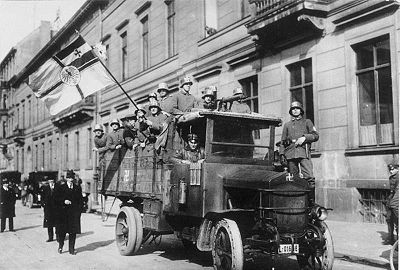- Marinebrigade Ehrhardt
-
 Marinebrigade Erhardt during the Kapp Putsch in Berlin, 1920[1]
Marinebrigade Erhardt during the Kapp Putsch in Berlin, 1920[1]
The Marinebrigade Ehrhardt was a Free Corps (Freikorps) group of around 6,000 men formed by Captain (Korvettenkapitän) Hermann Ehrhardt in the aftermath of World War I, also known as II Marine Brigade or the Ehrhardt Brigade. It took part in the fighting for the cities of central Germany and the northwestern ports, in addition to participating in the Kapp Putsch.
The Brigade was formed from former Naval personnel in the area of Generalkommando des Garde-Korps (Berlin). It was commanded by the conservative Nationalist Hermann Ehrhardt and fought alongside the Freiw.Landesschützenkorps under General von Roeder in the retaking of Northwest German ports such as Bremen, Cuxhaven and Wilhelmshaven in early 1919. After the defeat of the northern revolutionary forces the Brigade marched to the industrial cities of central Germany (along with the Freiw.Landesjägerkorps, I Marine Brigade, Freikorps Hülsen, Freikorps Görlitz and Freikorps von Oven) to defeat the local communist uprisings.
After the defeat of the uprisings, the Brigade went on to fight the Bavarian Soviet Republic during the spring of 1919. It made up only a small fraction of the total Freikorps forces, which totaled to around 30,000 men. At the end of April the Freikorps closed in on Munich. The Red Guards began arresting suspected "counterrevolutionaries" and on April 29, eight men, including the well-connected Prince Gustav of Thurn and Taxis, were executed as right-wing spies. Soon after, on May 3, the Freikorps attacked and defeated the insurgent forces after bitter street fights in which over 1,000 communist fighters were killed. About 800 men and women were arrested and executed by the victorious Freikorps.
In August 1919, the Brigade went to Upper Silesia, where Polish nationalists had attempted to forcibly annex the region to Poland[citation needed]. Local Freikorps, reinforced by groups such as the Brigade and the III Marine Brigade, easily repressed the First Silesian Uprising.
After the signing of the Treaty of Versailles, the new Weimar Republic had friends neither in the Freikorps nor the old Imperial army and many conspiracies blossomed. The Marinebrigade Ehrardt was involved in one of them, the Kapp-Lüttwitz Putsch.
 Kapp Putsch, 1920[2]
Kapp Putsch, 1920[2]
In March 1920, orders were issued for the disbandment of the Brigade. Its leaders were determined to resist dissolution and appealed for support to General Walther von Lüttwitz, commander of the Weimar Republic's Armed Forces (Reichswehr) in Berlin. Lüttwitz, an organiser of Freikorps units in 1918-19 and a fervent monarchist, responded by calling on President Ebert and Defence Minister Noske to stop the disbandment. When Ebert refused, Lüttwitz ordered the Brigade to march on Berlin. It occupied the capital on March 13. Lüttwitz, therefore, was the driving force behind the putsch. Its nominal leader, though, was Wolfgang Kapp, an irresolute and indecisive East Prussian civil servant, though a fervent nationalist.
The Reichswehr, under orders from Chef der Heeresleitung General Hans von Seeckt, one of the Reichswehr's senior commanders, did not try to confront the rebels, but their only other support came from some small Freikorps groups, and the only one that made a serious move was the III Marine Brigade, under Von Löwenfeld, in Silesia, who took the regional capital, Breslau. The government issued a proclamation calling on Germany's unions to defeat the putsch by means of a general strike. The strike call received massive support and by March 18, the Putsch had been a massive failure.
After the Putsch, the Marinebrigade Ehrhardt was ordered to be disbanded by General von Seeckt, but it continued to function under different covers such as Bund ehemaliger Ehrhardtoffiziere, Organisation Consul and Sportverein Olympia.
References
- Cuomo, Glen R. Weimar-era Timeline New College of Florida.
External links
Categories:- 20th-century Freikorps
- Weimar Republic
Wikimedia Foundation. 2010.
